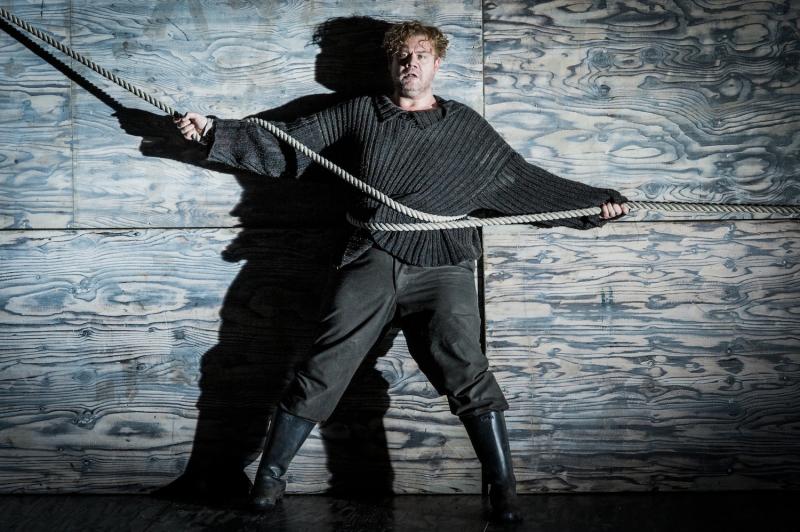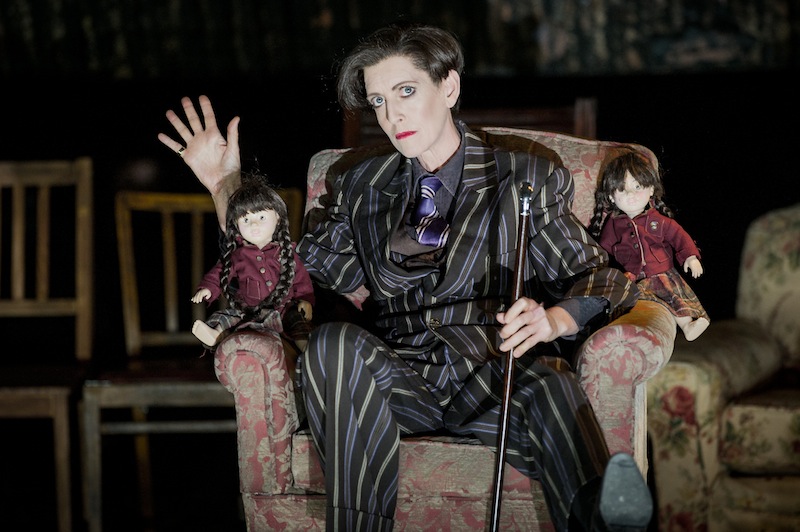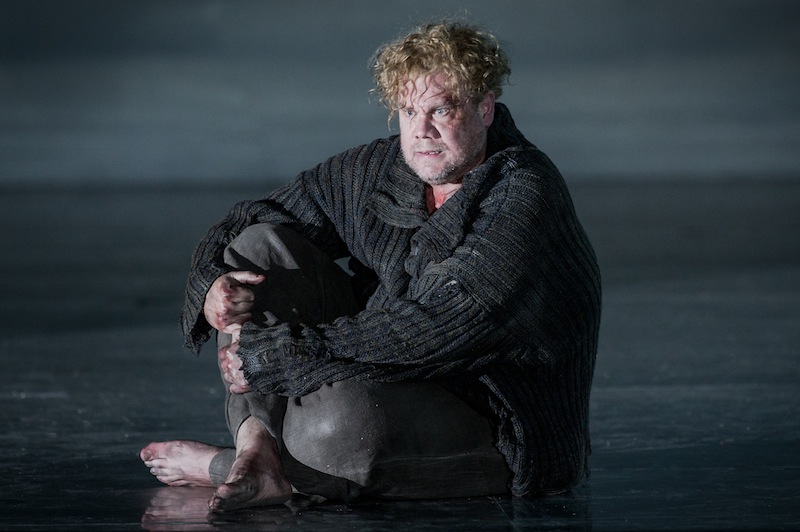Peter Grimes, English National Opera | reviews, news & interviews
Peter Grimes, English National Opera
Peter Grimes, English National Opera
David Alden's revelatory staging of Britten's masterpiece makes a glorious return

“Mind that door.” With the hurricane howling outside it’s no wonder the locals gathered in Auntie’s pub are yelling... but there is no door. Instead, a stage-wide sheet of corrugated iron rears up to let in Stuart Skelton’s storm-tossed Peter Grimes. Enlarging naturalistic, close-up detail into full-blooded, expressionist drama is typical of this frankly electrifying revival of David Alden’s revelatory production of Britten’s masterpiece.
The fusion of sound and stage action in the very first moment makes it immediately clear that this production is operatic in the best sense. With the houselights still up and before a note of music is heard, the threatening chorus is revealed at the back of the stage looming out of darkness, rumbling with discontent. Supported by the jaunty orchestral writing, the coroner in a makeshift court hastily assembled by the Borough townsfolk proceeds to interrogate Grimes about the death of his apprentice. Standing on top of the tables, Grimes appears as a stranded and awkward victim. Literally and metaphorically, he’s above everyone else, the image perfectly capturing why almost everyone hates him.
With the stakes already set unusually high, Alden’s production never lets up, the tension amplified by the extreme dynamic range Edward Gardner coaxes from his orchestra. His handling, for example, of the storm interlude isn’t just about impressively implacable brass playing, he elicits terror via vividly etched whiplash squeals of the high woodwind and strings. He pulls tempi around too, allowing Britten’s extraordinary orchestration to breathe – has the richness of the harp writing ever been so evident?
Impressive though such detailing is, it wouldn’t have such thrilling impact were not everything in service of such compellingly sung drama. Nothing has been taken for granted: every moment in the score and libretto has been freshly thought through and, crucially, every character, the women in particular.
 In her UK debut, Elza van den Heever’s beautifully forbearing Ellen Orford is all the more touching for the breadth of her vocal and dramatic range. She’s even granted a rare moment of happiness, tossing her hat delightedly in the air at the Sunday morning sunshine. Mrs Sedley, the troublemaker who revels in Grimes’ misfortunes, is generally played merely as a frumpy comic pillar of supposed rectitude. Felicity Palmer, on top fierce form, makes her every inch the self-serving, secret laudanum addict who is not above grabbing the apothecary Ned Keene (a gloriously self-satisfied Leigh Melrose) and kneeing him in the groin to get what she wants from him.
In her UK debut, Elza van den Heever’s beautifully forbearing Ellen Orford is all the more touching for the breadth of her vocal and dramatic range. She’s even granted a rare moment of happiness, tossing her hat delightedly in the air at the Sunday morning sunshine. Mrs Sedley, the troublemaker who revels in Grimes’ misfortunes, is generally played merely as a frumpy comic pillar of supposed rectitude. Felicity Palmer, on top fierce form, makes her every inch the self-serving, secret laudanum addict who is not above grabbing the apothecary Ned Keene (a gloriously self-satisfied Leigh Melrose) and kneeing him in the groin to get what she wants from him.
Recognising that Britten’s writing for the two “nieces” is near identical, costume designer Brigitte Reiffenstuel dresses them identically almost throughout as worryingly overgrown schoolgirls. Their disturbingly dead-eyed performances – and everyone’s sexualised behaviour in the party in the penultimate scene – makes it clear that they are used by all the rankly hypocritical men.
Moments and scenes like that might sound like directorial imposition, yet everything in Alden’s stark, bold vision is rooted in the text, nowhere more so than in his brilliant re-imagining of Auntie. In Rebecca de Pont Davies’ magnetic, beady performance (pictured above), she’s one part pub landlady, one part brothel-keeper. Striding about in full-length fur, she dominates the stage and the town and acts as a way in for the audience. She stands uniquely apart, making money out of exploiting the town while being a scourge of its herd instinct.
That instinct is made particularly powerful by the handling of the first-rate chorus within Paul Steinberg’s sets. Beneath Adam Silverman’s startlingly intense lighting, angular walls of sea-beached Suffolk clapboard, driftwood and metal are cunningly repositioned to create a sequence of atmospheric but extraordinarily dynamic spaces. The opera’s most famous moment, as the town bays for blood screaming “Peter Grimes!”, is all the more shattering for being suddenly confined in a small space, an arresting image of wall-to-wall, flag-waving hatred.
That epic moment gives way to the wide-open pain of Peter’s final scene. Early on, Skelton serves notice that this Grimes is belligerent. Facing out the storm, his “I shall stay” isn’t the approximate cry marked in the score, it’s a thundering high roar of blind defiance.
 Crucially, his lumbering Grimes (pictured left) cannot understand and mend his actions because he lacks the mental awareness. He's a pained and painful blunderer whose intense emotions and thoughts are unfinished and breathtakingly raw. That’s why he flinches at Ellen’s touch and why his inward, awestruck pianissimo singing of his vision of the night skies “Now the Great Bear and Pleiades” lifts the hairs on the back of your neck.
Crucially, his lumbering Grimes (pictured left) cannot understand and mend his actions because he lacks the mental awareness. He's a pained and painful blunderer whose intense emotions and thoughts are unfinished and breathtakingly raw. That’s why he flinches at Ellen’s touch and why his inward, awestruck pianissimo singing of his vision of the night skies “Now the Great Bear and Pleiades” lifts the hairs on the back of your neck.
Having made no attempt to hide Grimes‘ bullying, his ultimate breakdown is all the more upsetting. The inevitability of his final collapse sets the seal on an audacious, masterly production that puts to death the ridiculous assumption that opera singers cannot act. Anyone remotely interested in opera, and especially anyone who thinks opera isn’t for them, should race to see this in the flesh. If that’s impossible, don’t despair: it’s being screened in cinemas on Feb 23. Unmissable.
- ENO's Peter Grimes is in rep at the London Coliseum till 27 Feb
- Click here for details of cinema screenings
rating
Share this article
Add comment
The future of Arts Journalism
You can stop theartsdesk.com closing!
We urgently need financing to survive. Our fundraising drive has thus far raised £49,000 but we need to reach £100,000 or we will be forced to close. Please contribute here: https://gofund.me/c3f6033d
And if you can forward this information to anyone who might assist, we’d be grateful.

Subscribe to theartsdesk.com
Thank you for continuing to read our work on theartsdesk.com. For unlimited access to every article in its entirety, including our archive of more than 15,000 pieces, we're asking for £5 per month or £40 per year. We feel it's a very good deal, and hope you do too.
To take a subscription now simply click here.
And if you're looking for that extra gift for a friend or family member, why not treat them to a theartsdesk.com gift subscription?
more Opera
 La bohème, Opera North review - still young at 32
Love and separation, ecstasy and heartbreak, in masterfully updated Puccini
La bohème, Opera North review - still young at 32
Love and separation, ecstasy and heartbreak, in masterfully updated Puccini
 Albert Herring, English National Opera review - a great comedy with depths fully realised
Britten’s delight was never made for the Coliseum, but it works on its first outing there
Albert Herring, English National Opera review - a great comedy with depths fully realised
Britten’s delight was never made for the Coliseum, but it works on its first outing there
 Carmen, English National Opera review - not quite dangerous
Hopes for Niamh O’Sullivan only partly fulfilled, though much good singing throughout
Carmen, English National Opera review - not quite dangerous
Hopes for Niamh O’Sullivan only partly fulfilled, though much good singing throughout
 Giustino, Linbury Theatre review - a stylish account of a slight opera
Gods, mortals and monsters do battle in Handel's charming drama
Giustino, Linbury Theatre review - a stylish account of a slight opera
Gods, mortals and monsters do battle in Handel's charming drama
 Susanna, Opera North review - hybrid staging of a Handel oratorio
Dance and signing complement outstanding singing in a story of virtue rewarded
Susanna, Opera North review - hybrid staging of a Handel oratorio
Dance and signing complement outstanding singing in a story of virtue rewarded
 Ariodante, Opéra Garnier, Paris review - a blast of Baroque beauty
A near-perfect night at the opera
Ariodante, Opéra Garnier, Paris review - a blast of Baroque beauty
A near-perfect night at the opera
 Cinderella/La Cenerentola, English National Opera review - the truth behind the tinsel
Appealing performances cut through hyperactive stagecraft
Cinderella/La Cenerentola, English National Opera review - the truth behind the tinsel
Appealing performances cut through hyperactive stagecraft
 Tosca, Royal Opera review - Ailyn Pérez steps in as the most vivid of divas
Jakub Hrůša’s multicoloured Puccini last night found a soprano to match
Tosca, Royal Opera review - Ailyn Pérez steps in as the most vivid of divas
Jakub Hrůša’s multicoloured Puccini last night found a soprano to match
 Tosca, Welsh National Opera review - a great company reduced to brilliance
The old warhorse made special by the basics
Tosca, Welsh National Opera review - a great company reduced to brilliance
The old warhorse made special by the basics
 BBC Proms: The Marriage of Figaro, Glyndebourne Festival review - merriment and menace
Strong Proms transfer for a robust and affecting show
BBC Proms: The Marriage of Figaro, Glyndebourne Festival review - merriment and menace
Strong Proms transfer for a robust and affecting show
 BBC Proms: Suor Angelica, LSO, Pappano review - earthly passion, heavenly grief
A Sister to remember blesses Puccini's convent tragedy
BBC Proms: Suor Angelica, LSO, Pappano review - earthly passion, heavenly grief
A Sister to remember blesses Puccini's convent tragedy
 Orpheus and Eurydice, Opera Queensland/SCO, Edinburgh International Festival 2025 review - dazzling, but distracting
Eye-popping acrobatics don’t always assist in Gluck’s quest for operatic truth
Orpheus and Eurydice, Opera Queensland/SCO, Edinburgh International Festival 2025 review - dazzling, but distracting
Eye-popping acrobatics don’t always assist in Gluck’s quest for operatic truth

Comments
Opera in cinemas, is this the
Opera in cinemas, is this the future? I purchased my tickets in advance for the February 23 viewing at a cinema. I viewed the trailer and it looks spectacular. There will be some enhancements in viewing the production on screen. I understand that there will be a camera discreetly operated by a performer that will give you a unique perspective. Never thought of viewing opera in a cinema, but when you think about it, you will receive high definition viewing along with surround sound. All my experiences viewing operas in the past have been at a distance that required opera glasses which limits your field of vision. I'll be sure to review the entire performance after attending.
Well, Bob: opera in cinema is